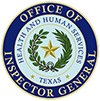OIG Data Initiatives Project Team reports record recoveries
The OIG continues to broaden its use of data analysis to help uncover fraud, waste and abuse (FWA) trends in the health care system by assessing potentially problematic behavior patterns.
The OIG’s Data Initiatives Project Team (DIPT) is using data to streamline operations while driving collaboration across the agency’s divisions to produce multi-million-dollar recoveries from Medicaid providers. DIPT focuses its data analysis on providers who may be receiving Medicaid payments improperly. When OIG staff see an issue or a problem that arises with one provider, DIPT can analyze data from across the Texas health care system to determine whether similar issues are occurring with other providers who participate in Medicaid.
Opening investigations
Whenever DIPT identifies behavior that may indicate FWA, it partners with the OIG’s data team to initiate a sophisticated data analysis that can spot the same behavior occurring across the state. One of the top allegations involves emergency room injection and infusion cases. These cases deal with providers who have double-billed for injections and infusions in the emergency department when the charges were already covered by the payment of an emergency room evaluation and management charge.
The team recently completed the investigation on three cases and referred them to the OIG’s Litigation Team. The potential value of the overpayment, based on certified paid claims, for those three cases, is over $15.5 million. Working with providers, DIPT recently identified, analyzed and investigated a new scenario where providers are improperly using a billing modifier to obtain additional Medicaid funds when the patients do not have the appropriate medical condition or diagnoses for the provider to bill for the extra dollar amount. The team opened 20 new cases involving UA modifiers for private duty nursing. The UA modifier in question is a billing code for private duty nursing patients with a tracheostomy or who are ventilator dependent. The providers were using the UA billing code when the patients did not have a tracheostomy or were not dependent on a ventilator. DIPT worked collaboratively with the providers, their compliance departments and their legal counsel to reach an understanding that certain, specific patients did not have the appropriate diagnosis code and should not have received the extra payment for the modifier.
Case settlements
DIPT's efforts have led to settlements totaling more than $48 million. By harnessing the power of data analytics and the expertise of OIG staff, investigators and attorneys, DIPT can handle cases in a more efficient manner from the moment a case is initiated to its final resolution.

